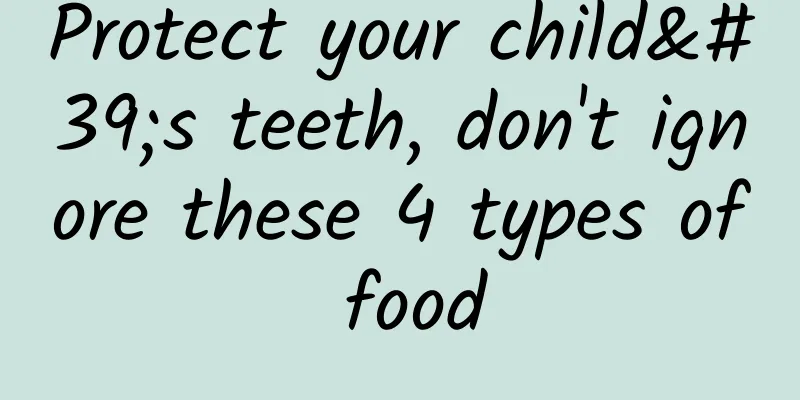Can you still eat food that has just passed its expiration date by one or two days? Many people misunderstand these 4 points!

|
On March 27, the National Health Commission and the State Administration for Market Regulation issued 50 national food safety standards and 9 standard amendments, adding two new standards: "shelf expiration date" and "consumer shelf life". What impact will the addition of these two standards have on consumers? Can food still be eaten if it is one or two days past its expiration date? Is food always safe within its shelf life? Where does the term shelf life come from? Faced with unopened food that has just passed its expiration date at home, many people have the dilemma of "It's a pity to throw it away, but I'm afraid of getting sick if I don't throw it away." However, what is the expiration date? What does the expiration date mean? Is it the "gold standard" for measuring spoilage? First, let’s look at the conclusion: the shelf life is not the same as the expiration date of the food. Professor Fan from the College of Food Science and Nutritional Engineering at China Agricultural University explained that the significance of setting a shelf life for food is: On the one hand, sellers and consumers are reminded that after food is stored for longer than its shelf life, there may be a risk of quality degradation, deterioration, or even corruption. On the other hand, it is used to define the food safety responsibilities of all parties. If the food is consumed within the set shelf life and there are quality and safety problems, the manufacturer or seller needs to bear the responsibility. Once the shelf life has passed, the food cannot be legally sold. Most pre-packaged foods need to be labeled with a shelf life , which is determined by the manufacturer based on shelf life experiments and in accordance with industry practices. Pre-packaged foods are foods that are pre-packaged or made in packaging materials and containers. Fresh agricultural products such as fresh vegetables, fruits, meat, fish, and eggs are not pre-packaged foods. Bulk foods such as bulk grains, as well as restaurant food, street snacks, freshly made dumplings and other freshly made and sold foods are also not pre-packaged foods and are not required to be labeled with a shelf life. The shelf life of these foods needs to be judged by life experience. Among them, catering food is best eaten immediately after purchase, otherwise it should be frozen in time. What are the new changes in the new standard? The state has newly issued the "General Rules for Pre-packaged Food Labeling" (GB 7718-2025) and the "General Rules for Pre-packaged Food Nutrition Labeling" (GB 28050-2025), which have "upgraded" food labeling. The main changes are: 1. Adjust the shelf life to "shelf expiration date". This label allows people to directly know when the food expires, without having to calculate it based on the production date combined with the shelf life. 2. The shelf life labeling format has been standardized. It is clearly marked in the order of year, month, and day, making the information display more intuitive. 3. To reduce food waste, the new standard encourages labeling of the “consumer shelf life”. If consumers do not finish the food within the shelf life after purchasing it, they can choose to continue eating it within the “consumer shelf life”, provided that the food is stored in accordance with the storage conditions indicated on the label. Have you fallen into these misunderstandings about shelf life? Myth 1: All foods must have a shelf life. Food spoilage is caused by the proliferation of microorganisms, while the appearance of "rancid smell", "old oil smell" and "wormwood smell" in food is related to fat oxidation. If these two problems do not exist, food can be stored for a long time. Foods such as liquor, salt, sugar, and honey have natural antibacterial properties due to their high alcohol, salt, and sugar content, and there is no problem of fat oxidation. Therefore, they can be stored for many years without the need to label a shelf life. Myth 2: The longer the shelf life, the more preservatives there are The shelf life of food is related to the characteristics of the food itself, the production process and the storage conditions. Traditional methods such as drying (removing moisture), salting, sugaring, and low temperature are all ways to achieve long-term food preservation. For example, it was discovered in ancient times that dried foods such as dried meat, dried fish, dried vegetables, dried fruits, as well as foods with high enough salt content such as salted fish, bacon, pickles, and fermented bean curd can be stored at room temperature for more than a year without spoiling, and there is no need to add preservatives. Through high temperature sterilization and aseptic filling technology, all microorganisms inside the package are killed, while ensuring that microorganisms outside the package cannot enter, which can also greatly extend the shelf life of food. Canned food, soft canned food and other products are produced using this principle. In addition, low-temperature quick freezing and storage under freezing conditions below -18°C can also prevent the proliferation and toxin production of microorganisms, extending the shelf life of food to one year or even longer. Myth 3: Throw away food after it has expired Generally speaking, food manufacturers set a certain margin for the shelf life. Especially for foods with a long shelf life, it is common for the food to not spoil after the "shelf life" marked on the package has passed. If it is thrown away easily, it will cause serious food waste. Whether it can be eaten at this time requires consumers to judge based on their life experience. If the flavor, color, taste, etc. have not changed, it can still be eaten safely. For example, if a canned food has a shelf life of two years and has been kept at home for two months, and the can shell is not swollen, and there is no peculiar smell after opening it, and the taste and texture have not changed, then it can be eaten. Although the vitamin content will decrease over time and the flavor will not be as good as when it was first produced, eating it will not cause food safety problems. To give another example, the rice, millet, beans, etc. bought at home, after being stored for more than a year, have not been affected by moisture, mold, or insects. There is no safety risk in continuing to eat them. The only difference is that the aroma is not as good as that of the newly produced grains of the year, and the taste value has decreased. Myth 4: As long as it is within the shelf life, it is safe Many people only look at the shelf life but do not pay attention to the shelf life conditions. For example, if a pasteurized milk product is marked to be refrigerated at 2-6°C and is not stored in accordance with refrigeration conditions, it may go bad prematurely if it is left at room temperature for a day or even a few hours. Therefore, we remind everyone to pay attention to the storage conditions on the food packaging, such as "refrigerated", "store in a cool place", "avoid moisture", etc. In addition, the shelf life of food that has been sterilized and sealed can only guarantee the storage time before opening. After opening, the food is exposed to microorganisms in the air and cannot be stored for a long time at room temperature. For example, the packaging of seasoning sauces such as ketchup, soybean sauce, and mushroom sauce often has the words "Please refrigerate after opening". Source: Jointly produced by People's Daily WeChat and Life Times WeChat Preliminary review: Chen Jiaqi and Li Shuhao Review丨Wei Xinghua Final Review丨Han Yonglin |
<<: "Breakthrough therapy"! Chinese scientists activate new role of "anti-cancer agent"
Recommend
What to do if your breasts are sagging and soft
Many mothers who have given birth will experience...
How should women take care of themselves after giving birth?
Giving birth to a child is a particularly harmful...
Where should I place cupping to warm the uterus?
In today's society, most women suffer from ut...
What are the symptoms before death?
Many women are first-time mothers, so they don’t ...
How to treat uterine prolapse before delivery?
For women who are already in the late stages of p...
What should I do if I have a gynecological ovarian cyst?
Gynecological diseases are common diseases in mod...
What is the best thing for girls to eat to lose weight during menstruation?
The menstrual period is the time when women are m...
Is it bad if the follicle is too big?
For women who want to have children, they are ver...
Why does menstruation only come for one day?
As we all know, a normal menstrual period for wom...
When is the ovulation date if the menstruation comes on the 16th?
As for the calculation method of ovulation period...
What is the use of thyroid function test in pregnant women
Ensuring the baby's health needs to start whe...
What to do if the echo of the anterior uterine wall is thickened and uneven
Female diseases are now very common, and various ...
Can I have sex if there is blood four days after my period?
We all know that menstruation is a normal physiol...
What are the benefits of women wearing jade bracelets?
As the saying goes, "Jade nourishes people&q...









